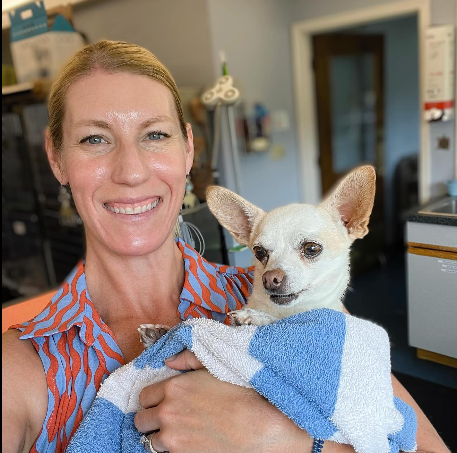It is not advised to use hydrogen peroxide on dogs to eradicate fleas. Although hydrogen peroxide has some antibacterial qualities and is occasionally used to treat canine wounds, treating fleas with it is neither safe nor effective. Direct application of hydrogen peroxide to a dog’s skin may result in allergic responses, dryness, and irritation. Furthermore, it doesn’t completely eradicate fleas.
Treating fleas on a targeted basis with solutions made especially for dog flea control is necessary. Many safe and effective flea treatments are available, including topical treatments, sprays, shampoos, and oral drugs that are developed to successfully eliminate fleas without endangering your pet. These treatments are highly recommended by veterinarians.
When choosing the best and safest flea treatment for your dog, it’s imperative to speak with a veterinarian to confirm, is hydrogen completely safe for dogs? They can advise you on the best flea control treatments based on your dog’s age, size, health, and level of infestation, so you can be sure your pet is receiving effective treatment without running any risks to their safety. Dogs’ vulnerability to flea infestations
When to Use Hydrogen Peroxide to Clean Pet Wounds: In certain situations, hydrogen peroxide can be used to clean pet wounds. It’s frequently used on pets with little wounds or shallow cuts as an antibacterial. Its bubbling action helps to clear the wound and remove debris. Hydrogen peroxide should only be used, nevertheless, under the guidance of a veterinarian.
Hydrogen peroxide (3% solution) diluted with water can be gently applied to clean minor wounds or abrasions to help disinfect the wound. However, hydrogen peroxide might not be appropriate for wounds that are deeper or more serious. Deep cuts should not be treated with hydrogen peroxide since this could harm good tissues and impede healing. In these situations, seeking veterinarian care is safer and more beneficial.
Rinse the area well with clean water after using hydrogen peroxide to clean the wound in order to get rid of any leftover debris. Furthermore, make sure it’s the appropriate course of action for the particular damage and obtain appropriate information on wound care by always seeing a veterinarian before applying hydrogen peroxide or any other antiseptic on your pet’s wounds.
When Not to Clean Pet Wounds with Hydrogen Peroxide:
Avoid using hydrogen peroxide for cleaning pet wounds in certain situations, as it may not be appropriate and could potentially do more harm than good:
Deep or Serious Wounds: In deeper or more severe wounds, hydrogen peroxide can harm healthy tissues and impede the healing process. Large cuts, punctures, or serious injuries shouldn’t be treated with it.
Sensitive Areas: Hydrogen peroxide should not be used close to delicate regions like the ears, eyes, or mucous membranes. In these sensitive locations, it may irritate or sting.
Chronic or Persistent Wounds: Hydrogen peroxide might not work for wounds that are persistent or chronic. Hydrogen peroxide may not resolve the underlying problems with these wounds, and they may need to be treated with specialist care or medical treatment.
Frequent Use: Hydrogen peroxide use that is excessive or prolonged might irritate skin and slow down the healing process. It’s crucial to heed a veterinarian’s advice and not abuse it.
Allergic Reactions: Hydrogen peroxide sensitivity or allergy may exist in certain pets. If your pet shows any indications of discomfort, redness, or negative reactions, stop using it and consult a veterinarian.
Will it Hurt a Dog to Lick Hydrogen Peroxide?
Yes, licking or ingesting hydrogen peroxide can harm a dog. When consumed in large quantities, hydrogen peroxide can irritate and harm a dog’s digestive system. It may produce symptoms including diarrhea, vomiting, and pain in the abdomen. In extreme situations, it may even result in ulcers or other digestive problems.
Furthermore, the hydrogen peroxide’s bubbling effect may result in foaming or bubbling in the dog’s stomach, which may be uncomfortable or distressing. Generally speaking, it’s imperative to keep dogs away from hydrogen peroxide and other items that are not suited for ingestion.
~You should seek advice from a veterinarian right away if you think your dog may have accidently consumed hydrogen peroxide. The veterinarian can offer guidance on the right actions to take and any treatments that are required to guarantee your pet’s wellbeing.
How Do You Go About Preparing The Solution Safely?
When preparing a solution with hydrogen peroxide for wound cleaning, it’s crucial to follow these safety guidelines:
1. Use a 3% hydrogen peroxide solution for dilution: Dilute it with water; for wound cleaning, a 50:50 hydrogen peroxide to water ratio is usually advised. This produces a kinder solution that is safe to use on small wounds and won’t irritate them.
2. Clean Containers: To combine the solution, use bottles or other clean containers. Make sure there are no impurities or residues on them to avoid any infection or reaction with the hydrogen peroxide.
3. Measuring: To maintain the proper concentration, measure the solution precisely using exact measures. This guarantees that the solution is not too strong to damage the wound or the pet, nor is it too weak to be ineffective.
4. Application: Apply the solution to the wound using sterile, clean gauze or a cotton ball. To stop more irritation, carefully dab or wipe the wound with the solution while avoiding applying too much pressure.
5. Rinsing: Use clean water to completely rinse the wound after applying the hydrogen peroxide solution. This aids in clearing the wound of any leftover solution or debris.
Prior to applying hydrogen peroxide or any other disinfectant to your pet’s wounds, always get advice from a veterinarian. They can guarantee your pet’s safety and wellbeing, offer appropriate counsel, and suggest the best wound care techniques.
Conclusion
In certain situations, hydrogen peroxide can be used carefully to clean small pet wounds. It can help disinfect if used sparingly and diluted with water. But it’s important to take precautions, stay away from deep wounds, and consult a veterinarian. Safe and efficient wound care for pets is ensured by knowing whether to use or avoid hydrogen peroxide, its possible hazards, and the right preparation techniques. In order to guarantee your pet’s wellbeing and the best possible outcome from their wound care, you should always seek the advice and direction of a veterinarian.
Po

Dr. Allison Kramer is a seasoned veterinarian with a Master’s degree in Animal Behavior and over 10 years of experience specializing in canine health and behavior. Her expertise in positive reinforcement training and holistic care enhances the well-being of dogs and fosters strong pet-owner relationships. For expert advice and valuable insights, follow Dr. Kramer on Instagram @dr.allisonkramer.





